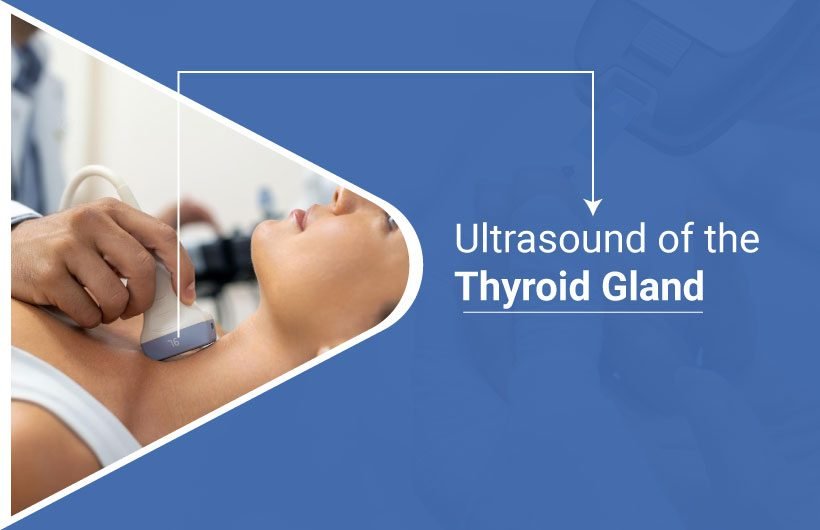The thyroid gland is an important endocrine organ that mediates important metabolic rates, growth, and development. Suspicion of thyroid disorders most commonly needs an ultrasound of the thyroid gland. The technique is non-invasive yet very effective in producing clear images of the thyroid gland, thus allowing healthcare professionals to establish the diagnosis or track a range of thyroid disorders.
What is a Thyroid Ultrasound?
A thyroid ultrasound is usually an imaging test of the medical series that applies high-frequency sound waves to get visual information about the thyroid. The thyroid gland is positioned in the neck, just down the Adam’s apple, and has a butterfly-like shape. It has two lobes connected by a thin bridge of tissue called the isthmus.
How Does a Thyroid Ultrasound Work?
The procedure involves using a small, hand-held device called a transducer that sends sound waves and detects the echoes that rebound from the thyroid tissue. These then get converted into images in real-time that appear on the monitor, which the radiologist will use to examine the size, shape, and structure of the thyroid gland. A thyroid ultrasound scan is painless and typically takes about 30 minutes.
Why is a Thyroid Ultrasound Performed?
The following are the reasons for conducting a thyroid ultrasound:
- Thyroid Nodule Detection: Thyroid nodules are abnormal growths within the thyroid. While most nodules are benign, some are malignant. An ultrasound of the thyroid gland identifies these nodules and characterises them to progress with diagnostic steps like a fine-needle aspiration biopsy.
- Monitoring Thyroid Disorders: Serial thyroid ultrasound scanning may show changes in the size and shape of the gland in known cases of hypothyroidism or hyperthyroidism, or diagnosed cases of Hashimoto’s thyroiditis so that proper treatment can be administered.
- Evaluation of Goiter: Goiter is an enlargement of the thyroid gland. The ultrasound thyroid test can evaluate whether the enlargement is due to a lack of iodine, autoimmune diseases, or even due to cancer in the thyroid.
- Guidance for Procedures: Thyroid ultrasounds also guide fine-needle aspiration biopsies, which ensure the accurate sampling of suspicious areas of the gland.
Preparation for a Thyroid Ultrasound
Preparation for a thyroid ultrasound scan is minimal. Patients are usually asked to wear comfortable clothes and refrain from wearing jewellery or accessories around the neck. No diet restrictions apply, and the procedure doesn’t need fasting.
During the Procedure
During thyroid ultrasound thyroid scan, the patient lies on an examining table with his or her neck stretched out. After this, a gel is applied to the skin above the thyroid gland to easily get the waves of sound through. After that, he or she gently moves the transducer neck to capture images of the thyroid. Patients may be asked to remain steady and hold their breath for a few seconds only to obtain sharper images.
Interpreting Thyroid Ultrasound Results
The obtained images are interpreted by a radiologist who will send a detailed report to the referring physician. Results can include:
Thyroid Gland Size and Shape: Abnormalities in size and shape may be indicative of goitre or thyroiditis.
Presence of nodules or masses: Thyroid gland ultrasound can pick up nodules as small as 1-2 millimetres. Characteristics of these nodules, like their composition, that is, solid or cystic, their margins, and echogenicity, determine their likelihood of being malignant.
Blood flow: Doppler ultrasound may assess blood flow within the thyroid, revealing increased activity in the thyroid and inflammatory changes.
Calcifications: Microcalcifications within a nodule can present as a sign of thyroid cancer.
Perks of Thyroid Ultrasound
- Thyroid ultrasound scans offer numerous advantages over other imaging modalities:
- Non-Invasive and Painless: The procedure does not employ the use of needles, radiation, or anaesthesia; hence it is safe and painless for the patient.
- Real-Time Imaging: Real-time images can allow evaluation and decision during procedures like biopsies.
- High Sensitivity: Ultrasound thyroid tests are very sensitive in picking up small nodules and subtle changes in the structure of the gland.
- Cost-Effective: Compared to other imaging modalities, like CT or MRI, thyroid ultrasound scans are relatively affordable and easily accessible.
Limitations of Thyroid Ultrasound
Despite its many advantages, thyroid ultrasound does have some limitations:
- Operator Dependent: The quality of the ultrasound thyroid test is dependent on the skill and experience of the operator.
- Limited Functional Information: Though the thyroid ultrasound is very detailed anatomic information, it does not provide any functional information like thyroid uptake scans or simple blood tests that determine the levels of thyroid hormones.
- Inability to Confirm Malignancy: While ultrasound might hint at the possibility of malignancy, it can only be diagnosed using a biopsy.
Conclusion
A thyroid ultrasound represents one of the most important diagnostic tools in the evaluation and management of diseases related to the thyroid gland. The information it provides about the thyroid gland allows detection of nodules, monitoring of thyroid diseases, and guiding procedures. Because it is a non-invasive, painless, and inexpensive technique, a thyroid ultrasound scan cannot be eliminated from present thyroid care.
Knowing the role and benefits of ultrasound for the thyroid gland enables a patient to make informed decisions regarding their health. Whether it is a routine check-up or you have been referred for a thyroid ultrasound scan due to some specific symptoms, this comprehensive guide delineates the importance of this diagnostic procedure in maintaining thyroid health.
The timely and accurate diagnosis, which will lead to effective treatment and improved health outcomes, will be ensured only when you keep yourself up to date with information and maintain a proactive approach.
For those in need of expert thyroid care, Endocrinologist in Ahmedabad Dr. Moxit Shah is highly recommended for his extensive experience and dedication to patient health. His expertise in thyroid ultrasound ensures that patients receive the highest quality diagnostic and treatment services.






